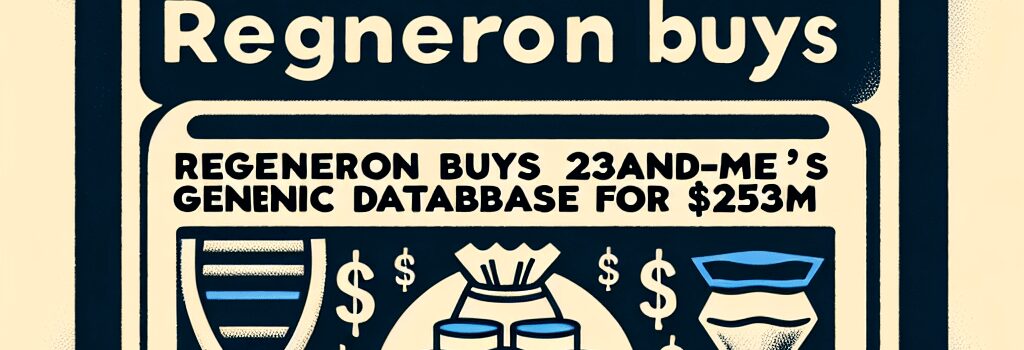Regeneron Buys 23andMe’s Genetic Database for $256M

Biotech powerhouse Regeneron Genetics Center has emerged victorious in a Chapter 11 bankruptcy auction, signing a definitive agreement to purchase 23andMe for $256 million. The acquisition ensures continuity of the direct-to-consumer genetic testing service and secures the private genomic profiles of over 15 million users worldwide.
Deal Overview and Bankruptcy Context
The transaction, expected to close by Q3 2025 upon approval by the U.S. Bankruptcy Court for the Eastern District of Missouri, was one of seven competitive bids. A court-appointed privacy ombudsman will oversee compliance with existing data-use policies and ensure customer protections remain intact.
- Purchase Price: $256 million in cash
- Customer Base: 15 million genotyped users
- Regeneron Database: Already includes ~3 million exome and genome-sequenced samples
Technical Infrastructure and Data Security
Under the hood, Regeneron operates a hybrid architecture combining on-premises HPC clusters with Amazon Web Services and Google Cloud Platform for scalable storage and compute. Data at rest and in transit is encrypted using AES-256 protocols, while multi-party computation and emerging fully homomorphic encryption (FHE) solutions are in pilot stages to enable secure cross-cohort analyses.
“We maintain rigorous SOC 2 and ISO 27001 compliance, ensuring that 23andMe’s raw genotype arrays, exome sequences, and imputed variant datasets remain secure,” said Aris Baras, SVP of Regeneron Genetics Center.
Advanced Analytics and AI-Driven Discovery
Regeneron will integrate 23andMe’s SNP-array and microarray data into its existing genomics pipelines. Utilizing deep learning frameworks such as PyTorch and TensorFlow on GPU clusters, the combined dataset will power:
- Genome-wide association studies (GWAS) at unprecedented scale
- Machine learning models for polygenic risk scoring
- AI-driven phenotype prediction and drug target identification
According to Dr. Jane Kim, a computational genomics expert at Stanford University,
“Integrating heterogeneous genotype data enhances our power to detect low-frequency variant associations. Regeneron’s cloud-based ML infrastructure can accelerate lead compound discovery by months.”
Pipeline Acceleration and CRISPR Functional Screens
By cross-referencing 23andMe’s self-reported phenotypic surveys with electronic health records and in vitro CRISPR knockout screens, Regeneron aims to refine its human knockout model pipelines, expediting validation of gene targets for rare diseases.
Regulatory and Ethical Oversight
Federal Trade Commission Chair Rebecca Slaughter emphasized that Regeneron must adhere to 23andMe’s original privacy policies. Additionally, California’s CCPA and new state guidelines around genetic data privacy will apply. Key provisions include:
- User opt-in consent for secondary research uses
- Right to request data deletion under CCPA
- Independent audits by third-party privacy ombudsmen
Market Impact and Financial Implications
The $256 million purchase price marks a steep decline from 23andMe’s 2021 peak valuation of $6 billion. The buyout underscores:
- Challenges in monetizing one-time genotyping products
- Importance of recurring revenue models via pharma collaborations
- Valuation gap between DTC testing and therapeutics-driven genomics
Future Therapeutic Pipeline Potential
Regeneron projects that integrating 23andMe’s extensive dataset could add 20–30 novel targets to its pipeline within 12–18 months. Proprietary AI algorithms will prioritize targets by:
- Genetic penetrance and allele frequency analyses
- Causal network inference using Bayesian models
- In silico docking simulations to estimate druggability
“This acquisition fundamentally shifts the paradigm for target discovery,” commented Dr. Alan Thompson, Director of Genomics at Biogen. “Access to millions of consented genomes accelerates our ability to model human diseases and develop precision therapies.”
Employee Retention and Cultural Integration
Regeneron has pledged to retain 23andMe’s core scientific and technical staff, fostering integration into the Regeneron Genetics Center. Cross-functional teams will collaborate on bioinformatics, data engineering, and clinical development projects.
Conclusion
By securing 23andMe’s genetic treasure trove, Regeneron not only safeguards consumer data but also turbocharges its genomics R&D engine. The move reflects a broader industry trend toward data-driven drug discovery, where scale, AI, and robust privacy frameworks are critical to success.